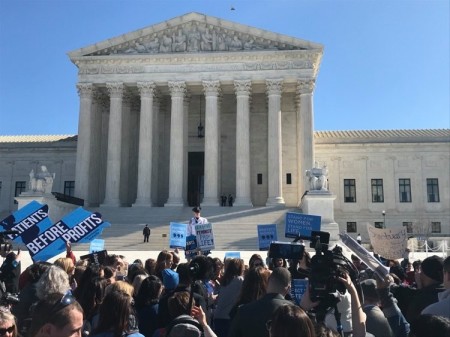Judge orders documents from June Medical Services Supreme Court abortion case to be unsealed

In a victory for pro-life activists, a federal judge ordered the release of documents from a recent Supreme Court case that abortion providers fought to keep under seal.
In an order written last Thursday that was published this week, Magistrate Judge Richard Bourgeois of the U.S. District Court for the Middle District of Louisiana ordered the release of several documents related to the 2020 case June Medical Services, LLC v. Russo.
In that case, the Supreme Court ruled 5-4 that Louisiana’s Unsafe Abortion Protection Act, which required abortion doctors to have admitting privileges at nearby hospitals, was unconstitutional because it created an “undue burden” for women seeking abortions. June Medical Services, along with other abortion providers, filed the lawsuit against the law.
Bourgeois’ court ruling lists some of the documents that abortion providers had hoped to keep under seal, including “hospital bylaws, admitting privileges or procedures, (and) credentialing processes or procedures” as well as “testimony pertaining to clinic conditions and practices, and/or hospitalizations relating to abortions.”
While many documents that abortion providers sought to keep under seal will be released under the order, a handful of documents will remain confidential.
Jeff Landry, the Republican attorney general of Louisiana, reacted favorably to Bourgeois’s order to unseal documents.
“For too long, the public has been barred from critical information relating to the safety of women and girls in Louisiana,” said Landry. “The State has fought for more open access; yet journalists and elected officials alike were prohibited from accessing public facts only because they had become part of the court’s record.”
“Today, that affront to our First Amendment is over,” he added. “Now the public may be able to see the full record in cases where abortion providers are seeking to minimize regulation against a backdrop of documented health and safety violations, destruction of medical records, and medical malpractice.”
Landry contends that “access should never be able to supersede safety.”
As explained in a court filing submitted on their behalf, a group of journalists, academics and legislators had sought access to the court records, arguing that they needed the documents to “write and publish news stories and law review articles analyzing the Supreme Court’s decision, as well as to pass new laws that do not create an undue burden.”
“The record documents proposed to be sealed are of vital importance to the applicants,” the court filing argued. “In this case this Court, the Fifth Circuit, and the Supreme Court all viewed the same facts yet came to different conclusions. This is because, in part, the undue burden standard that potentially renders an abortion law unconstitutional is a fact-specific standard.”
The brief claims that “without these documents, the Applicant Journalists and Other Members of the Media and Applicant Academics will be constrained in their ability to write and publish on the Supreme Court’s holding because they will be limited to a sanitized record that reveals only what Plaintiffs want to see.”
Those seeking access to the court records argued that Supreme Court precedent from the 1978 case Nixon v. Warner Communications, Inc. proves that they had a First Amendment right to access the documents.
The aforementioned Supreme Court case found that “the courts of this country recognize a general right to inspect and copy public records and documents, including judicial records and documents.”
Under federal law, these public documents can only remain under seal if a party can demonstrate “good cause” for protecting them from public scrutiny.
The plaintiffs seeking to keep the documents from being unsealed argued that unsealing would reveal the identities of the abortion providers.
However, evidence exists that “several aspects of these identities are already known,” lawyers for the movants assert.
“The public’s right to access judicial records is not absolute, but given such a right, to deny intervention would be inappropriate,” Bourgeois wrote in the order. “Intervenors seek to assert and protect the public’s general right to access judicial records, an essential interest that is not currently represented, and therefore, intervention is justified and appropriate.”





















